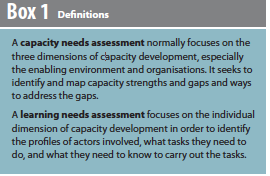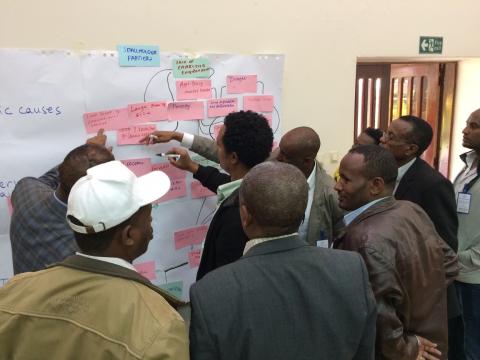Developing capacity needs assessments for nutrition-sensitive agriculture in Ethiopia
Workicho Jateno is an agriculture and rural development expert who leads FAO Ethiopia’s Social Economic Team and coordinates multi-sector and joint UN activities in the fields of nutrition, food security and social protection.
Charlotte Dufour is Nutrition Officer in the Nutrition and Food Systems Division of the UN Food and Agriculture Organization, specialising in nutrition-sensitive agriculture and food systems.
Background
The Government of Ethiopia’s distinctive political commitment on nutrition is enshrined in the Seqota Declaration, National Nutrition Strategy (NNS, 2008) and National Nutrition Programme (NNP). The Ministry of Agriculture and Natural Resources (MoANR) demonstrates its commitment by mainstreaming nutrition in flagship programmes such as the Agricultural Growth Programme II (AGP-2) and the Productive Safety Net Programme IV (PSNP- 4) and adopting the Nutrition-Sensitive Agriculture Strategic Plan 2016-2021 (NSASP). The NSASP was designed through a multi-stakeholder consultation. It includes the following key objectives: increasing the production, access and consumption of diverse, safe and nutrient-dense foods from animal and plant sources for all people at all times; enhancing the resilience of vulnerable population groups using social transfer schemes and programmes; mainstreaming gender in agriculture; strengthening multisector coordination and improving the monitoring of agriculture’s impact on nutrition.
 The implementation of strategies requires significant efforts to develop capacities for nutrition-sensitive agriculture (NSA). But capacities of who? To do what? This article describes the importance of organisational capacity needs assessments and individual learning needs assessments (see Box 1) and the use of participatory methods as an effective means of collecting information while building consensus on capacity development priorities.
The implementation of strategies requires significant efforts to develop capacities for nutrition-sensitive agriculture (NSA). But capacities of who? To do what? This article describes the importance of organisational capacity needs assessments and individual learning needs assessments (see Box 1) and the use of participatory methods as an effective means of collecting information while building consensus on capacity development priorities.
Strengthening capacities for nutrition-sensitive agriculture
Developing capacities for NSA is often conceived as providing nutrition training for agricultural extension workers. However, NSA requires a broader range of tasks, responsibilities and levels of engagement. The MoANR’s Agriculture Technical Taskforce therefore mandated FAO – with support from the European Commission – to conduct a capacity-needs assessment to inform the implementation of the NSASP.
In response to this request, FAO and MoANR organised three organisational capacity needs assessment workshops at federal and decentralised levels1 with two objectives: 1) identify capacity strengths and gaps for NSA, and 2) provide training on basic concepts and approaches for NSA. The workshops were attended by participants from MoANR, Ministries of Livestock and Fisheries (MoLF), Health and Education, development partners and civil society organisations (CSOs). They were organised in two parts:
- First, participants constructed problem and solution trees of malnutrition by livelihood groups2 (smallholder farmers; rural landless; vulnerable/poor pastoralists and the urban poor) to reach a shared understanding of what NSA and food systems mean and identify the priorities for making agriculture nutrition-sensitive for each livelihood group.
- Second, participants assessed the organisational capacities and enabling environment for NSA. Participants worked in groups to identify the main stakeholders who are, or should be, involved in NSA and qualitatively assess their capacities to:
- Formulate and revise NSA policies;
- Develop and implement NSA programmes;
- Monitor results; and
- Coordinate with government and non-government actors working in nutrition.
The methodology built on FAO’s Capacity Development Approach3 and the UN Network for SUN’s Nutrition Capacity Assessment Guidance Package4. The workshops included presentations of existing capacity needs surveys conducted by partners in Ethiopia and lessons learnt from ongoing NSA capacity-development programmes.
Capacity strengths identified by participants included the existence of the MoANR NSA Strategy, Nutrition Case Team and Technical Working Group (TWG) to support nutrition mainstreaming in agriculture. Major programmes (such as the Agriculture Growth Programme) are taking active steps to mainstream nutrition and there is in-country capacity to collect food consumption data, a key indicator for NSA.
Participants identified the following broad areas as priorities for capacity development:
- Awareness-raising and training on NSA among a wider range of staff and at a greater scale, both at federal and woreda (district) levels;
- Strengthening multi-sector coordination, especially at decentralised levels where communication between agriculture coordination bodies and nutrition coordination bodies is limited;
- High-level advocacy to strengthen political commitment for NSA in all relevant ministries (including MoLF) and at all levels of decision-making;
- Strengthening the government structure for NSA, in particular by enhancing the authority of nutrition advisors on decision-making and ensuring greater support to nutrition in the livestock and fisheries sector;
- Ensuring nutrition is addressed in key policy frameworks related to food and agriculture; and
- Monitoring NSA programmes, in particular through greater use of individual dietary indicators (e.g. minimum dietary diversity for women) and better integration of health and agriculture data.
The findings of the workshops are used to inform the design and implementation of well- coordinated capacity-development activities for NSA led by the Government and supported by UN agencies, NGOs and development partners at federal and woreda levels in Ethiopia.
Learning needs assessments: The case of agriculture extension workers
The participatory capacity needs assessment described above focused on organisational capacities and the enabling environment but it is also important to focus on the individuals responsible for carrying out the tasks identified. These include policy-makers and advisors, programme designers and implementers, data experts, agricultural extension workers and farmers. Effective capacity development requires identifying what they can do for NSA, and what they need to know and know how to do to fulfil their role.
MoANR had already identified capacity development of agricultural extension workers on nutrition as a priority and, with the support of FAO, established a Technical Working Group including NGOs and development partners with the purpose of developing reference training materials for this audience. Lessons learnt from existing experiences in Africa show that nutrition materials for extension workers often draw on materials for community health workers and are not adapted to the tasks and learning needs of agricultural extension agents, leading to limited uptake and use of the trainings. To avoid a similar situation, the Extension Directorate of MoANR and FAO conducted a participatory learning needs assessment.
The first step entailed preparing a ‘white paper’ describing the categories of extension workers5, their terms of reference, the nutrition-related tasks they could be asked to perform and the knowledge and skills they would need to perform them. The white paper findings were discussed in a multi- stakeholder workshop in December 2016, where participants identified common and specific learning needs for each type of extension worker. Key knowledge needs included: types, causes and consequences of malnutrition; impact pathways between agriculture/livestock/fisheries and nutrition; healthy diets and nutritional value of foods; gender roles and nutrition; and roles of different sectors in nutrition. Key skills needs included analysing causes of malnutrition at the local level; improving the production and processing of nutritious foods (including fruits, vegetables, livestock, fish products); behaviour change communication; and working with multi- disciplinary teams. The findings provide the basis for a comprehensive curriculum, tailored to extension agents’ needs, which is guiding the development of the training materials commissioned by MoANR.
Lessons learnt
Successful capacity development for NSA requires that the trainings and support provided be adapted to various agriculture professionals involved. Participatory capacity needs assessment methods and learning needs assessments require a substantial time commitment, but are very efficient in ensuring strategic targeting of capacity-development efforts and building a common vision and shared set of priorities that enable partners to coordinate their efforts to scale up NSA.
The main challenges encountered in the Ethiopian experience were the time required to align the financial and technical assistance resources needed and the availability of all key stakeholders; the fatigue associated with numerous consultation processes; and the need to maintain momentum after the workshops. But through the workshop evaluations, participants confirmed the exercise was very relevant and effective. Key success factors included strong government leadership in the process and partners’ willingness and enthusiasm to work together and share knowledge, resources and experiences.
Acknowledgements: The article and process it describes are a team effort made possible by the key contributions of Sally Berman (Capacity Development officer, FAO HQ), Yvette Fautsch Macías (Nutrition Officer, FAO-HQ), Robert Fungo (Nutrition consultant, FAO Ethiopia), Tarik Kassaye (Nutrition consultant, FAO Ethiopia) and Dia Sanou (Nutrition officer, FAO East Africa).
References
FAO, 2017: Integration of Nutrition in Agriculture Extension Services in Afric – A desk review of country case studies, pre-service and in-service training materials www.fao.org/3/a-i6891e.pdf
1The administrative levels include the following: federal, region, zone, woreda (district) and kebele (the smallest unit of local government or ward). The regions covered included Oromia, Amhara, Tigray and Afar.
2Using the FAO methodology Agreeing on Causes of Malnutrition for Joint Action: www.fao.org/3/a-i3516e.pdf
3org/capacity-development/resources/fao-learning-material/learningmodules/en/
4UN Network for SUN. 2016. Nutrition Capacity Assessment Guidance Package. Available on UN SUN website.
5Categories of extension workers were: crops, livestock, natural resources, animal health and farmers’ cooperatives coordination experts, and ‘head of kebele’ agriculture development agents.


